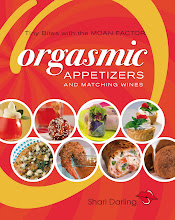
Darling's Ribs, recipe below
Grilling ribs on the barbie is one of my favourite summer pastimes. Babyback pork and beef ribs offer a good layer of flesh and fat, making them ideal for sauces that caramelize nicely when grilled.
The old cheese cliche certainly works for ribs: No fat, no flavour. The endless array of sauce recipes that complement pork and beef ribs also makes them ideal for wine partnerships.
When it comes to barbecue dining, be sure to choose an inexpensive wine. Why invest in a costly vintage when you won't be able to appreciate the subtle aromas? The wine must compete with the strong smell of barbecue smoke, the wind and perhaps the smell of swimming pool chlorine. It's also beneficial to choose whites, roses and light, fruity red wines for barbecue dining. All can be chilled, and so are refreshing in the hot, summer sun.
Chilled and refreshing wines also contrast nicely with hot ribs off the barbie. Many people assume that a big red wine is the best match for heavy meats. But white wines, roses and light, fruity reds partner well with pork and beef ribs. The key is to consider the building blocks in the food and in the wine and how they work together.
Here are a few examples. If you are coating pork ribs in a sweet, fruit-based sauce such as a spicy peach sauce, choose a white wine with a hint of sweetness. Why? Because the primary building block in most fruit-based sauces is sweetness. While this sweetness would clash with the bitterness (tannin) in a big, full-bodied red wine, it is ideal to pair with the building block of sweetness in an off-dry white wine such as Gewürztraminer.
Let's look at a spicy horseradish sauce made of sour cream, prepared horseradish, mayonnaise, wine vinegar, and dried mustard for pork ribs. Sour cream and mayonnaise possess the building block of fattiness. Horseradish sauce is spicy. So this rib sauce recipe requires a big,luscious, full-bodied white wine to stand up to the fattiness of sour cream and mayonnaise, yet with a hint of sweetness to offset the spiciness of horseradish. An off-dry Gewürztraminer or off-dry Riesling would do the trick.
Korean sweet and sour soy sauce made of pineapple, light soy sauce, rice vinegar, sugar and pine nuts is a great  sauce on pork ribs to pair with an off-dry rose. This wine will have enough acidity (sourness) to pair with the saltiness of soy sauce and to offset the sourness of vinegar. Yet, the wine's hint of sweetness balances the sweetness of pineapples. Both the sauce and wine have sweet and sour building blocks that balance each other.
sauce on pork ribs to pair with an off-dry rose. This wine will have enough acidity (sourness) to pair with the saltiness of soy sauce and to offset the sourness of vinegar. Yet, the wine's hint of sweetness balances the sweetness of pineapples. Both the sauce and wine have sweet and sour building blocks that balance each other.
 sauce on pork ribs to pair with an off-dry rose. This wine will have enough acidity (sourness) to pair with the saltiness of soy sauce and to offset the sourness of vinegar. Yet, the wine's hint of sweetness balances the sweetness of pineapples. Both the sauce and wine have sweet and sour building blocks that balance each other.
sauce on pork ribs to pair with an off-dry rose. This wine will have enough acidity (sourness) to pair with the saltiness of soy sauce and to offset the sourness of vinegar. Yet, the wine's hint of sweetness balances the sweetness of pineapples. Both the sauce and wine have sweet and sour building blocks that balance each other.What about traditional barbecue sauce? Ketchup is often the base ingredient of many barbecue sauce recipes. It is high in sugar and so works nicely with a rose possessing a hint of sweetness.
I discovered a fantastic rib sauce recipe at a London, Ontario Rib Festival about 15 years ago. Here is my version...
Darling's Rib Sauce:
1 cup ketchup
1/4 cup of balsamic vinegar
1 whole bulb of peeled and minced garlic
Half an onion, finely diced
Sea salt to taste
Freshly ground black pepper to taste
Pinch of cayenne.
On low heat, simmer the sauce for a half hour before applying to ribs to finish them on the grill. (Photo above)
Beef ribs can carry heavier sauces and go nicely with chilled, luscious,light, fruity red wines with good complexity, such as Pinot Noir. Pinot noir is big enough to stand up to the pronounced flavours of dark soy sauce. Yet this wine has a refreshing backbone of acidity to offset the saltiness of soy sauce. And even though it's a red wine, it is meant to be slightly chilled. Put your Pinot Noir in the refrigerator for a half hour before serving.
Here's a fabulous rib recipe from my latest cookbook entitled Orgasmic Appetizers and Matching Wines. These ribs can be served as an appetizer or as an entree.
Lip-Smacking, Finger-Lickin’, Good and Messy Ribs
Serves 4 to 6
5 ½ lb baby back pork ribs*
1 bottle ale
Dry Rub:
1 tbsp sea salt
2 tbsp brown sugar
1 tbsp ground black pepper
1 tsp dried mustard
2 tbsp paprika
2 tbsp olive oil
Sauce:
1 cup ketchup
2 tbsp Dijon mustard
2 tbsp balsamic vinegar
2 tbsp Japanese sauce
2 tbsp molasses
1 bulb garlic, roasted
*Have your butcher remove the membrane on the ribs.
Preheat the oven to 350 F. Wash the ribs under cold water. Pat them dry. Pour the ale into the bottom of a roasting pan. Cut the ribs to fit onto the broiler rack of the roasting pan. Combine all the rub ingredients, except for the oil, in a bowl. Coat the ribs with the oil, then sprinkle them with the rub. Set aside.
Combine all the sauce ingredients in a small skillet and simmer the sauce on low heat for 15 minutes, stirring occasionally. Set aside.
Cover the ribs with foil, set on the pan and roast for 1 hour. Reduce the heat to 275 F and roast them for another 30 minutes. Remove the foil. Coat the ribs with the sauce and grill them on the barbecue for another 30 minutes, until the sauce is caramelized. Remove the ribs from the oven. Serve hot.
Suggested Wine:
The predominant building block is sweetness, due to the brown sugar and molasses. An off dry rose has enough sweetness to match. Choose an off dry rose with lots of dark berry fruit flavours to match the depth of earthy flavour in molasses.
Serves 4 to 6
5 ½ lb baby back pork ribs*
1 bottle ale
Dry Rub:
1 tbsp sea salt
2 tbsp brown sugar
1 tbsp ground black pepper
1 tsp dried mustard
2 tbsp paprika
2 tbsp olive oil
Sauce:
1 cup ketchup
2 tbsp Dijon mustard
2 tbsp balsamic vinegar
2 tbsp Japanese sauce
2 tbsp molasses
1 bulb garlic, roasted
*Have your butcher remove the membrane on the ribs.
Preheat the oven to 350 F. Wash the ribs under cold water. Pat them dry. Pour the ale into the bottom of a roasting pan. Cut the ribs to fit onto the broiler rack of the roasting pan. Combine all the rub ingredients, except for the oil, in a bowl. Coat the ribs with the oil, then sprinkle them with the rub. Set aside.
Combine all the sauce ingredients in a small skillet and simmer the sauce on low heat for 15 minutes, stirring occasionally. Set aside.
Cover the ribs with foil, set on the pan and roast for 1 hour. Reduce the heat to 275 F and roast them for another 30 minutes. Remove the foil. Coat the ribs with the sauce and grill them on the barbecue for another 30 minutes, until the sauce is caramelized. Remove the ribs from the oven. Serve hot.
Suggested Wine:
The predominant building block is sweetness, due to the brown sugar and molasses. An off dry rose has enough sweetness to match. Choose an off dry rose with lots of dark berry fruit flavours to match the depth of earthy flavour in molasses.





No comments:
Post a Comment